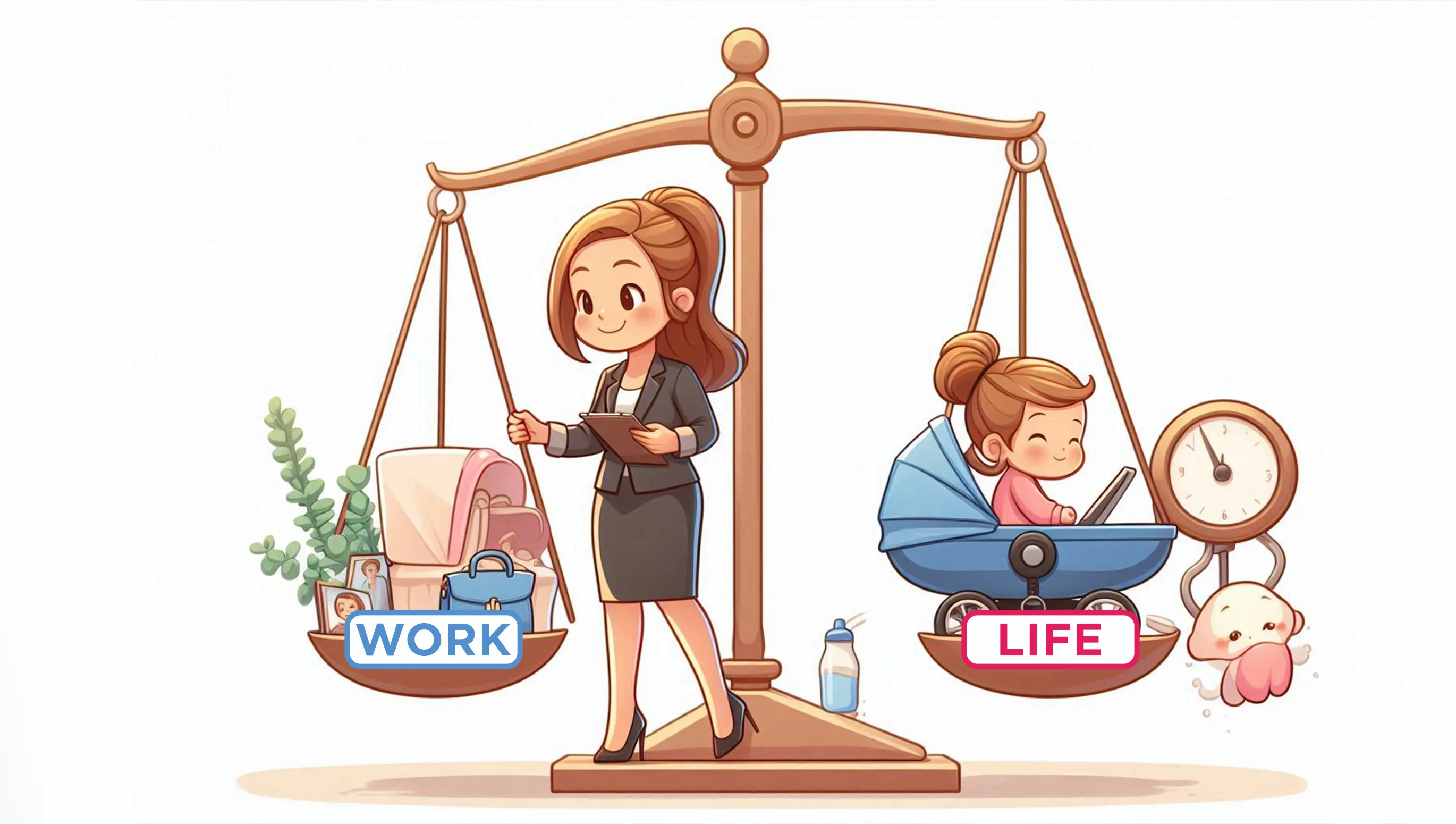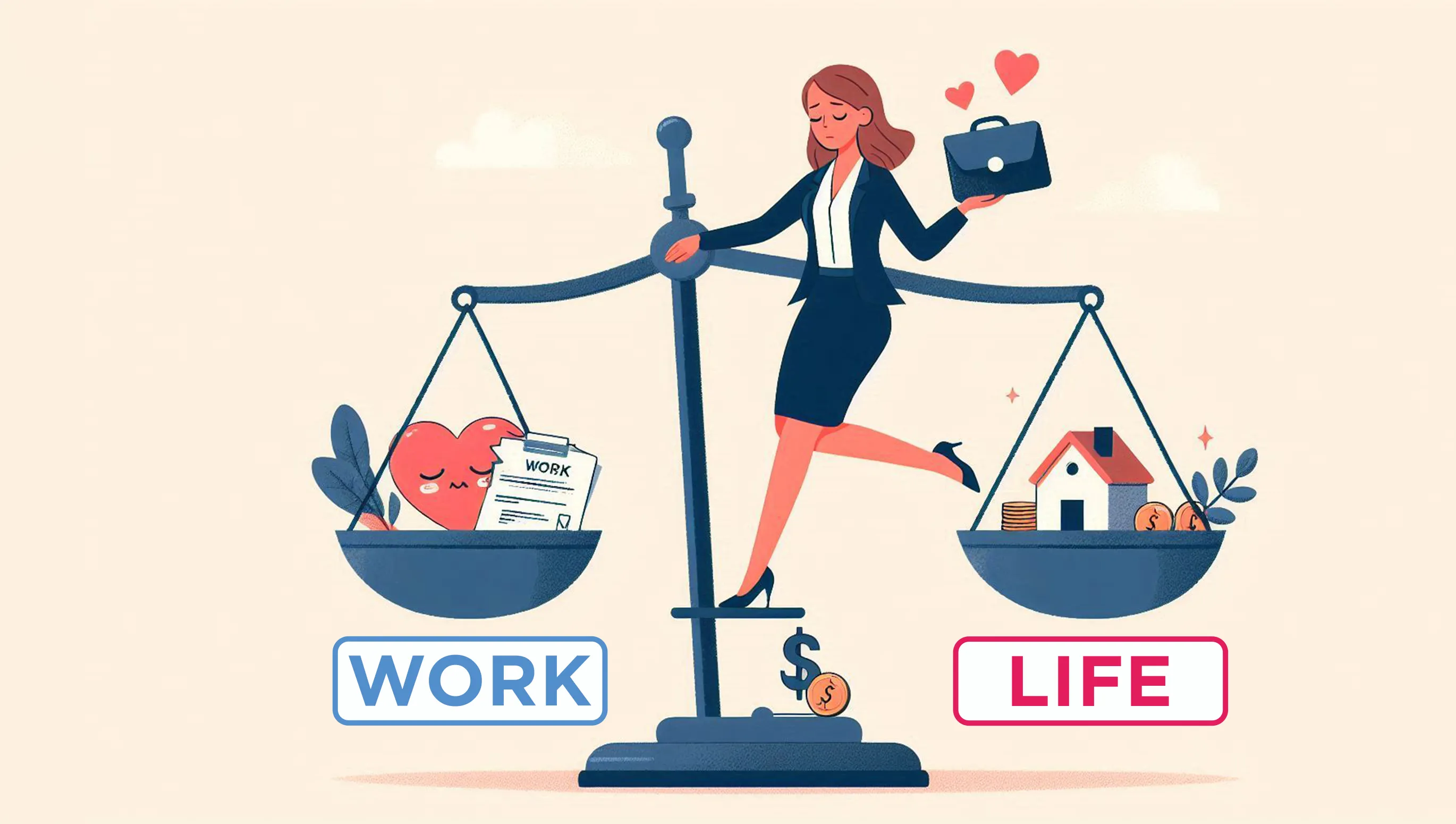Work-life balance: What is it and why is it so important?
Do you think working until you collapse is the path to success? Stop deceiving yourself. To continuously achieve your goals, you must pay attention to something important like the Work-Life-Balance. It's more than just a trendy term – it's a necessity for life.

Without a balance between work and personal life, burnout, loss of productivity, and health issues are inevitable. It's not about a choice but about survival. It's time to stop sacrificing your personal time for endless work tasks. It's important to find a harmony where your professional life does not disrupt your personal life. Understanding Work-Life-Balance will not only help you achieve professional success but also maintain your mental and physical health. Are you ready to learn how to do that? Then read on.
Table of Contents
What is Work-Life-Balance?
Work-Life-Balance is a harmonious blend of work and personal life that enables a person to effectively fulfill work duties while still having time for rest, family, hobbies, and self-development. It is a kind of balance between the hours spent at work and at home, as well as the ability to avoid conflicts between work and personal commitments while ensuring high quality of life and satisfaction in both areas.
Life is like riding a bicycle. To keep your balance, you must keep moving.
Albert Einstein
A successful Work-Life-Balance helps to prevent burnout, reduce stress, and increase overall productivity. It involves effective time management, developing stress management skills, the ability to delegate tasks, setting clear boundaries between work and personal time, and prioritizing one's own well-being. It's about pausing and switching from work matters to personal life, which is critical for long-term success and health.

Understanding and supporting Work-Life-Balance are key to sustainable development in both professional and personal lives. In today's fast-paced world, it is necessary because the lack of this balance can lead to serious physical and psychological problems.
Why is Work-Life-Balance so Important?
Work-Life-Balance is a critical aspect that affects your health, productivity, and overall life satisfaction. It's not just another trendy concept, but a necessity in the modern world where work demands often overshadow personal life. But why is it so important? Let's delve into that.
It's all about quality of life and finding a happy balance between work and friends and family.
Philip Green
Increasing Productivity
Studies from Emerald Insight have shown that employees with a good Work-Life-Balance are more productive. They perform their tasks better, are less easily distracted, and are absent less frequently due to stress-related or illness-related conditions. Organizational productivity rises when employees' work and personal lives are balanced.
Reducing Burnout
A lack of balance between work and personal life often leads to burnout. This can cause physical and emotional exhaustion, reduced efficiency, and depression. Employees with a healthy balance are less susceptible to these negative effects, as confirmed by numerous studies.
Improving Overall Health
People with a good Work-Life-Balance generally have better health indicators. They take more time for physical exercise, healthy eating, and relaxation, directly reducing the risk of cardiovascular diseases, diabetes, and other chronic illnesses.
Increasing Life Satisfaction
People who manage to balance work and personal life are often more satisfied with their lives. They have more time for hobbies, interacting with family and friends, contributing to emotional balance and a sense of happiness.

How to Recognize an Imbalance between Work and Personal Life?
It can be difficult to recognize that your balance between work and personal life is disturbed. However, there are certain signs that can indicate this. Understanding these symptoms will help you take timely action to restore harmony. If you feel constant stress, dissatisfaction, or physical exhaustion, this could be a sign that your balance is disturbed. Here are the main signs of an imbalance between work and personal life to look out for:
- Constant Fatigue: Exhaustion, even after the weekend and despite resting periods, indicates that there is no real balance. This leads to reduced productivity and a deterioration of overall health, which can cause long-term issues.
- Lack of Time for Personal Life: If your personal life constantly takes a back seat to work, it can lead to isolation and disappointment. A lack of time for family, friends, and hobbies negatively affects mental health and leads to feelings of loneliness.
- Sleep Problems: Frequent thoughts about work at night can cause insomnia. Inadequate sleep, in turn, impairs the ability to function effectively during the day, leading to reduced productivity and health problems.
- Decrease in Productivity: Are you working more but achieving fewer results? This could be a sign of burnout. Overloading at work reduces concentration and efficiency in task completion, affecting the overall outcome.
- Constant Stress and Anxiety: Continuous feelings of stress and anxiety about work undermine mental and physical health. This indicates an inability to find a balance between work and personal life, leading to serious health problems.
- Deterioration of Physical Health: Frequent headaches, digestive problems, or other physical symptoms may result from constant stress and lack of recovery.
- Relationship Problems: Excessive work negatively impacts relationships with close individuals. Without time for conversations and support, relationships suffer, leading to feelings of isolation and disappointment.
- Disappointment and Dissatisfaction with Life: Feeling restricted only by work leads to disappointment, which can escalate into depression. The consistency of this phenomenon indicates a lack of life satisfaction.
- Inability to Concentrate on Work: Difficulty concentrating and persistently focusing on tasks can also be signs of burnout and overexertion. This affects the efficiency and quality of your tasks.
- Apathy towards Everything except Work: A lack of interest in anything other than work indicates a concerning state. Apathy can lead to isolation, loss of life energy, and overall dissatisfaction with life.
- Declining Social Invitations: Frequently declining invitations from friends indicates an imbalance that affects social life.
- Accumulation of Household Tasks: If household tasks pile up due to excessive workload, this indicates a lack of time for personal duties. This situation creates additional stress and a sense of disorder.
- Difficulty Taking Vacation: The inability to take time off, even in case of illness or personal matters, indicates a disturbed balance. Working constantly without breaks also leads to burnout and serious health issues.
- Burnout: Physical, mental, and emotional exhaustion due to chronic stress and work-related pressures point to a neglect of the balance between personal and professional life. The inability to envision continuing work signals a serious problem.
- Feeling of Underachievement: A constant feeling of not doing what one should be doing indicates a lack of satisfaction with work and personal life. This can lead to a sense of hopelessness and depression.
- Constant Fatigue: Regular long working hours without adequate rest reduce efficiency and can cause serious health issues. Fatigue is a sign that work is taking up too much time in your life.
- Lack of Time for Self-Care: Lack of time for physical exercises, adequate sleep, and leisure leads to a deterioration of physical and mental health. Taking care of yourself should be a priority to maintain balance.
If you notice several of these signs regularly, you should recognize that the balance between work and personal life is already disturbed. Timely recognition of these symptoms allows you to take appropriate measures to restore harmony and improve the quality of life. Pay attention to your well-being and emotional state to respond to these signals in a timely manner.
Why is Work-Life Balance Disrupted?
The disruption of Work-Life Balance is often associated with the inability to separate work time and personal life. This can be attributed to excessive work demands where work takes up most of the time and leaves no space for relaxation and personal matters. Overload with work tasks leads people to have to work overtime by sacrificing their personal time.
Another reason is the high level of responsibility at work. When many tasks come your way, you feel constant pressure to complete everything on time and with quality. This leads to chronic stress and exhaustion, as you constantly think about work even in your free time. High responsibility can also lead you to take work home, deteriorating the separation between work and personal space.
Insufficient organization of the work process can also disrupt work-life balance. If work tasks are not effectively distributed or constant interruptions and distractions occur, you have to work longer to complete all tasks. This creates the feeling that work consumes all your time and you cannot concentrate on anything else.
Poor communication between management and employees also contributes to this negative phenomenon. The lack of clear instructions or support from management can lead to misunderstandings and additional stress. If you do not know which tasks have priority or how to properly execute them, you spend more time on work than necessary.

Another important factor is the personal inability to refuse additional tasks. By constantly taking on extra work to please supervisors or colleagues, you overload yourself. This ultimately results in work taking up all of your free time, leaving little room for relaxation and personal interests.
Furthermore, modern technologies significantly hinder the maintenance of work-life balance. Constant availability via email, messenger, and mobile apps means that work tasks can arise at any time, even outside of working hours. This creates the feeling that work never ends and that you must always be reachable.
The disruption of work-life balance can also be related to personal ambitions and the pursuit of success. The desire to climb the career ladder and achieve high performance in your field prompts many people to work overtime and sacrifice their personal time and health. This creates a cycle where work becomes the main focus, while other aspects of life take a back seat.
In summary, the disruption of work-life balance is the result of many factors, including excessive work demands, high responsibility, insufficient organization, poor communication, the inability to refuse additional tasks, constant availability through technology, and personal ambitions. Understanding these causes should help in finding ways to restore harmony between work and personal life.
When you have balance in your life, work becomes an entirely different experience. There is a passion that moves you to a whole new level of fulfillment and gratitude, and that's when you can do your best... for yourself and for others.
Cara Delevingne
How to establish a balance between work and leisure?
If you want to get your life in order, it's time to take action. The following steps can effectively address the problem and help you find a balance between work and personal life:
- Set clear boundaries between work time and personal time: Your work should not intrude into your personal space. Define the hours you work and stick to that schedule. Turn off work devices after hours to separate work and relaxation.
- Learn to say "No" to additional tasks: You don't always have to agree to everything offered to you. Know your limits and priorities. Refusing additional work allows you to focus on important tasks and find time for yourself.
- Plan your day to include relaxation time: Incorporate breaks and relaxation periods into your daily routine. Don't allow yourself to work non-stop, as this can lead to burnout. Breaks increase productivity and help preserve energy throughout the day.
- Recover qualitatively: Simply lying on the couch is not considered rest. Find activities that bring you joy and help you recharge. These can be sports, hobbies, meeting friends, or traveling. Quality recovery helps restore energy and improve mood.
- Optimize your work process: Use effective time management methods, such as the Pomodoro technique, to increase productivity and avoid overload. Organize your workspace to minimize distractions and focus on tasks.
- Take care of your health: Regular physical exercise, healthy eating, and sufficient sleep are the foundations of well-being. Do not neglect these aspects. They help preserve energy and increase productivity both at work and in personal life.
- Learn to delegate tasks: You don't have to do everything yourself. If possible, delegate part of your tasks to others. This allows you to free up time for more important tasks and reduce the workload.
- Develop stress management skills: Use relaxation techniques such as meditation, yoga, or breathing exercises to reduce stress. This helps you stay calm and maintain control over your emotions even in stressful situations.
- Take regular vacations: Your productivity decreases if you do not rest sufficiently. Regular vacations help regenerate your strength, improve mood, and increase efficiency. Plan your vacation in advance and do not neglect it.
- Seek support: Discuss your problems with friends, family, or colleagues. They can offer useful advice and support to help reduce stress and find the best solutions.

By implementing these recommendations in your life, you can establish a balance between work and leisure, increase your productivity, and improve your quality of life. Do not hesitate - start acting now!
Conclusion
Establishing a balance between work and leisure is a critically important task that requires decisive action and a clear plan. Setting clear boundaries between work and personal life, the ability to say "no" to additional tasks, effective daily planning, quality rest, optimization of work processes, caring for one's own health, delegating tasks, stress management, taking regular vacations, and support from the environment are the key steps to achieving harmony. Implement them boldly and without hesitation, and you will be able to conserve energy in the long term, increase your productivity, and improve your quality of life.
To maintain work-life balance at an appropriate level, it is very important to ensure mental health. A seemingly simple process like coloring coloring pages can help with this task. It contributes to reducing stress, improving concentration, and emotional state. It is an effective method to start anew after a stressful workday, release negative emotions, and restore inner harmony. Download our templates from the TutKit.com platform. Engaging in coloring will bring you peace and satisfaction, positively impacting your work-life balance.
From Vitalii Shynakov
